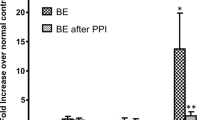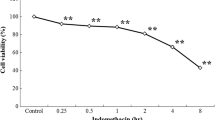Abstract
Rebamipide, a gastromucosal protective drug, suppresses indomethacin-induced gastropathy in humans and rodents. Effects of rebamipide on gene expression in indomethacin-treated gastric mucosal cells (RGM1) were investigated using high-density oligonucleotide arrays. Indomethacin induced apoptosis in RGM1 cells in a dose-dependent manner. Rebamipide pretreatment significantly reduced indomethacin-induced apoptosis. We used gene expression profiling on high-density oligonucleotide probe arrays to characterize the transcriptional response of RGM1 cells to indomethacin treatment for 6 hr. Of the 8,799 probes examined, 717 (8.1%) were induced (400 probes) or repressed (317 probes) at least 1.5-fold. Among the 158 genes that were induced by indomethacin at least 2.0-fold, four genes that were down-regulated by rebamipide at least 2.0-fold are listed: growth arrest and DNA-damage-inducible 45α (GADD45α), golgi SNAP receptor complex member 1, iodothyronine deiodinases, and transcription factor 8. Real time-PCR confirmed GADD45α expression and its inhibition by rebamipide. Inhibition of apoptosis-related genes is possibly important for the cytoprotective effect of rebamipide against indomethacin-induced gastric mucosal cell injury.
Similar content being viewed by others
References
Arakawa T, Watanabe T, Fukuda T, Yamasaki K, Kobayashi K: Rebamipide, novel prostaglandin-inducer accelerates healing and reduces relapse of acetic acid-induced rat gastric ulcer. Comparison with cimetidine. Dig Dis Sci 40:2469–2472, 1995
Arakawa T, Kobayashi K, Yoshikawa T, Tarnawski A: Rebamipide: overview of its mechanisms of action and efficacy in mucosal protection and ulcer healing. Dig Dis Sci 43:5S–13S, 1998
Haruma K, Ito M, Kido S, Manabe N, Kitadai Y, Sumii M, Tanaka S, Yoshihara M, Chayama K: Long-term rebamipide therapy improves Helicobacter pylori-associated chronic gastritis. Dig Dis Sci 47:862–867, 2002
Naito Y, Yoshikawa T, Matsuyama K, Yagi N, Nakamura Y, Nishimura S, Kondo M: Effect of rebamipide, a novel anti-ulcer agent, on acute gastric mucosal injury induced by ischemia-reperfusion in rats. Pathophysiology 1:161–164, 1994
Yoshikawa T, Naito Y, Nakamura S, Nishimura S, Kaneko T, Iinuma S, Takahashi S, Kondo M, Yamasaki K: Effect of rebamipide on lipid peroxidation and gastric mucosal injury induced by indometacin in rats. Arzneimittelforschung 43:1327–1330, 1993
Suzuki M, Miura S, Mori M, Kai A, Suzuki H, Fukumura D, Suematsu M, Tsuchiya M: Rebamipide, a novel antiulcer agent, attenuates Helicobacter pylori induced gastric mucosal cell injury associated with neutrophil derived oxidants. Gut 35:1375–1378, 1994
Yoshida N, Yoshikawa T, Iinuma S, Arai M, Takenaka S, Sakamoto K, Miyajima T, Nakamura Y, Yagi N, Naito Y, Mukai F, Kondo M: Rebamipide protects against activation of neutrophils by Helicobacter pylori. Dig Dis Sci 41:1139–1144, 1996
Yoshida N, Ishikawa T, Ichiishi E, Yoshida Y, Hanashiro K, Kuchide M, Uchiyama K, Kokura S, Ichikawa H, Naito Y, Yamamura Y, Okanoue T, Yoshikawa T: The effect of rebamipide on Helicobacter pylori extract-mediated changes of gene expression in gastric epithelial cells. Aliment Pharmacol Ther 18(Suppl 1):63–75, 2003
Yoshikawa T, Naito Y, Tanigawa T, Kondo M: Free radical scavenging activity of the novel anti-ulcer agent rebamipide studied by electron spin resonance. Arzneimittelforschung 43:363–366, 1993
Naito Y, Yoshikawa T, Tanigawa T, Sakurai K, Yamasaki K, Uchida M, Kondo M: Hydroxyl radical scavenging by rebamipide and related compounds: electron paramagnetic resonance study. Free Rad Biol Med 18:117–123, 1995
Sakurai K, Sasabe H, Koga T, Konishi T: Mechanism of hydroxyl radical scavenging by rebamipide: identification of mono-hydroxylated rebamipide as a major reaction product. Free Radic Res 38:487–494, 2004
Hahm KB, Park IS, Kim YS, Kim JH, Cho SW, Lee SI, Youn JK: Role of rebamipide on induction of heat-shock proteins and protection against reactive oxygen metabolite-mediated cell damage in cultured gastric mucosal cells. Free Radic Biol Med 22:711–716, 1997
Tsukimi Y, Fujishita T, Nakajima K, Okabe S: Effect of rebamipide on cell death induced by combined treatment of mild heat shock and quercetin in RGM-1 cells: a role for HSP70 induction. Pharmacology 64:28–35, 2002
Sun WH, Tsuji S, Tsujii M, Gunawan ES, Kawai N, Kimura A, Kakiuchi Y, Yasumaru M, Iijima H, Okuda Y, Sasaki Y, Hori M, Kawano S: Induction of cyclooxygenase-2 in rat gastric mucosa by rebamipide, a mucoprotective agent. J Pharmacol Exp Ther 295:447–452, 2000
Tarnawski AS, Chai J, Pai R, Chiou SK: Rebamipide activates genes encoding angiogenic growth factors and Cox2 and stimulates angiogenesis: a key to its ulcer healing action? Dig Dis Sci 49:202–209, 2004
Suetsugu H, Ishihara S, Moriyama N, Kazumori H, Adachi K, Fukuda R, Watanabe M, Kinoshita Y: Effect of rebamipide on prostaglandin EP4 receptor gene expression in rat gastric mucosa. J Lab Clin Med 136:50–57, 2000
Kobayashi I, Takei Y, Kawano S, Nagano K, Tsuji S, Fusamoto H, Matsui A, Ohno T, Nakama H, Fukutomi H, Sawaoka H, Kamada T, Masuda E: RGM1, a cell line derived from normal gastric mucosa of rat. In Vitro Cell Dev Biol-Animal 32:259–261, 1996
Hassan S, Kinoshita Y, Min D, Nakata H, Kishi K, Matsushima Y, Asahara M, He-yao W, Okada A, Maekawa T, Matsui H, Chiba T: Presence of prostaglandin EP4 receptor gene expression in a rat gastric mucosal cell line. Digestion 57:196–200, 1996
Ishiyama M, Tominaga H, Shiga M, Sasamoto K, Ohkura Y, Ueno K: A combined assay of cell viability and in vitro cytotoxicity with a highly water-soluble tetrazolium salt, neutral red and crystal violet. Biol Pharm Bull 19:1518–1520, 1996
Naito Y, Yoshikawa T, Fujii T, Boku Y, Yagi N, Dao S, Yoshida N, Kondo M, Matsui H, Ohtani FN, Sakai T: Monochloramine-induced cell growth inhibition and apoptosis in a rat gastric mucosal cell line. J Clin Gastroenterol 25:S179–S185, 1997
Slomiany BL, Piotrowski J, Slomiany A: Role of caspase-3 and nitric oxide synthase-2 in gastric mucosal injury induced by indomethacin: effect of sucralfate. J Physiol Pharmacol 50:3–16, 1999
Slomiany BL, Piotrowski J, Slomiany A: Induction of tumor necrosis factor-alpha and apoptosis in gastric mucosal injury by indomethacin: effect of omeprazole and ebrotidine. Scand J Gastroenterol 32:638–642, 1997
Kusuhara H, Matsuyuki H, Matsuura M, Imayoshi T, Okumoto T, Matsui H: Induction of apoptotic DNA fragmentation by nonsteroidal anti-inflammatory drugs in cultured rat gastric mucosal cells. Eur J Pharmacol 360:273–280, 1998
Zhu GH, Wong BC, Ching CK, Lai KC, Lam SK: Differential apoptosis by indomethacin in gastric epithelial cells through the constitutive expression of wild-type p53 and/or up-regulation of c-myc. Biochem Pharmacol 58:193–200, 1999
Fujii Y, Matsura T, Kai M, Matsui H, Kawasaki H, Yamada K: Mitochondrial cytochrome c release and caspase-3-like protease activation during indomethacin-induced apoptosis in rat gastric mucosal cells. Proc Soc Exp Biol Med 224:102–108, 2000
Naito Y, Yoshikawa T, Iinuma S, Yagi N, Matsuyama K, Boku Y, Fujii T, Yoshida N, Kondo M, Sasaki S: Rebamipide protects against indomethacin-induced gastric mucosal injury in healthy volunteers in a double-blind, placebo-controlled study. Dig Dis Sci 43:83S–89S, 1998
Kim TI, Jin SH, Kim WH, Kang EH, Choi KY, Kim HJ, Shin SK, Kang JK: Prolonged activation of mitogen-activated protein kinases during NSAID-induced apoptosis in HT-29 colon cancer cells. Int J Colorectal Dis 16:167–173, 2001
Bradbury CM, Markovina S, Wei SJ, Rene LM, Zoberi I, Horikoshi N, Gius D: Indomethacin-induced radiosensitization and inhibition of ionizing radiation-induced NF-kappaB activation in HeLa cells occur via a mechanism involving p38 MAP kinase. Cancer Res 61:7689–7696, 2001
Kim TI, Jin SH, Kang EH, Shin SK, Choi KY, Kim WH: The role of mitogen-activated protein kinases and their relationship with NF-kappaB and PPARgamma in indomethacin-Induced apoptosis of colon cancer cells. Ann N Y Acad Sci 973:241–245, 2002
Du K, Herzig S, Kulkarni RN, Montminy M: TRB3: a tribbles homolog that inhibits Akt/PKB activation by insulin in liver. Science 300:1574–1577, 2003
Hanada M, Feng J, Hemmings BA: Structure, regulation and function of PKB/AKT–a major therapeutic target. Biochim Biophys Acta 1697:3–16, 2004
Uchino H, Kanai Y, Kim do K, Wempe MF, Chairoungdua A, Morimoto E, Anders MW, Endo H: Transport of amino acid-related compounds mediated by L-type amino acid transporter 1 (LAT1): insights into the mechanisms of substrate recognition. Mol Pharmacol 61:729–737, 2002
Liebermann DA, Hoffman B: Myeloid differentiation (MyD) primary response genes in hematopoiesis. Blood Cells Mol Dis 31:213–228, 2003
Jin S, Antinore MJ, Lung FD, Dong X, Zhao H, Fan F, Colchagie AB, Blanck P, Roller PP, Fornace AJ, Jr., Zhan Q: The GADD45 inhibition of Cdc2 kinase correlates with GADD45-mediated growth suppression. J Biol Chem 275:16602–16608, 2000
Sheikh MS, Hollander MC, Fornance AJ, Jr.: Role of Gadd45 in apoptosis. Biochem Pharmacol 59:43–45, 2000
Wang XW, Zhan Q, Coursen JD, Khan MA, Kontny HU, Yu L, Hollander MC, O'Connor PM, Fornace AJ, Jr., Harris CC: GADD45 induction of a G2/M cell cycle checkpoint. Proc Natl Acad Sci USA 96:3706–3711, 1999
Takekawa M, Saito H: A family of stress-inducible GADD45-like proteins mediate activation of the stress-responsive MTK1/MEKK4 MAPKKK. Cell 95:521–530, 1998
Mita H, Tsutsui J, Takekawa M, Witten EA, Saito H: Regulation of MTK1/MEKK4 kinase activity by its N-terminal autoinhibitory domain and GADD45 binding. Mol Cell Biol 22:4544–4555, 2002
Bruemmer D, Yin F, Liu J, Berger JP, Sakai T, Blaschke F, Fleck E, Van Herle AJ, Forman BM, Law RE: Regulation of the growth arrest and DNA damage-inducible gene 45 (GADD45) by peroxisome proliferator-activated receptor gamma in vascular smooth muscle cells. Circ Res 93:e38-e47, 2003
Author information
Authors and Affiliations
Corresponding author
Rights and permissions
About this article
Cite this article
Naito, Y., Kajikawa, H., Mizushima, K. et al. Rebamipide, a Gastroprotective Drug, Inhibits Indomethacin-Induced Apoptosis in Cultured Rat Gastric Mucosal Cells: Association with the Inhibition of Growth Arrest and DNA Damage-Induced 45α Expression. Dig Dis Sci 50 (Suppl 1), S104–S112 (2005). https://doi.org/10.1007/s10620-005-2814-3
Received:
Accepted:
Issue Date:
DOI: https://doi.org/10.1007/s10620-005-2814-3




